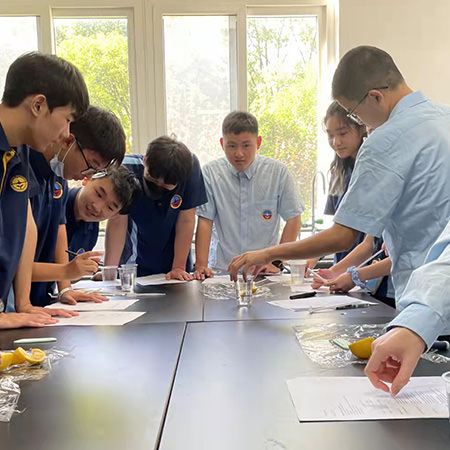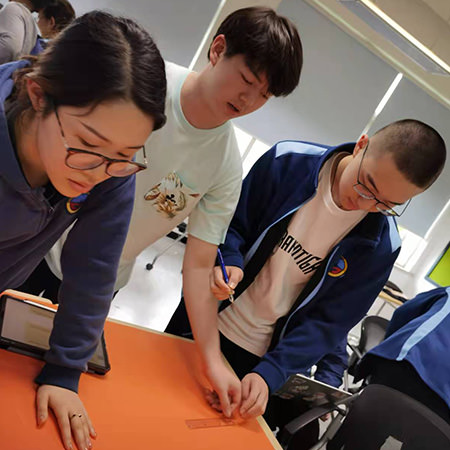IB-DP & CP 15-19
Students entering our high school begin in Pre-DP (grade 10). They spend the year getting academically ready for the IB Diploma or Career-related Programme. They work hard on their languages, English and Chinese, and on their science and mathematics skills by completing assessments based on IBDP teaching practice and marking criteria. In this way, they will be ready for challenges of the final two years. They choose from art, drama or music, as well as two sciences and between economics, geography or business management. PE and Approaches to Learning help their fitness and health and enhance their communication and academic skills.
Grade 10 is a vital year for students coming from other educational systems and other countries. It gives them time to understand the rigor of the IB and to decide if they are ready for it.
IBDP
NBHIS is an authorised IB World School offering the IB Diploma Programme to years 11 and 12; students 16-19 years old. This challenging, comprehensive programme is recognised by prestigious universities around the world as the “gold standard” of high school education. Its mission is to provide students with the skills to manage their present and future worlds, and to instil in them the responsibility for contributing positively and responsibly to their communities. Research on IBDP graduates demonstrates that they regularly finish their first degrees and go on to graduate school. They take up positions as advocates, and peacemakers alongside becoming leaders in law, medicine and business.
The IBDP educates the whole person. Students study subjects from within six Groups, three studied at Higher Level, and three at Standard Level. These represent all major disciplines and are studied concurrently along with the DP Core subjects of Creativity, Activity and Service (CAS), Theory of Knowledge (TOK) and the Extended Essay.
The majority subjects have Internal Assessment (IA) (marked by the school and moderated externally) and External Assessment (exams that are sat at school and marked externally). Studies in the Arts, do not have regularly examinations but rather extensive portfolio requirements.
Theory of Knowledge (TOK) is a transdisciplinary subject, which explores the nature and origin of knowledge and how it is acquired and passed on from generation to generation. Along with CAS it adds coherence to the IBDP programme.
CAS invites students to challenge themselves in active pursuits, in thoughtful creations and ideas, and in real and engaging service in their local and broader community. CAS draws upon the available arts and sports/fitness activities to promote lifelong healthy habits, while it challenges students to investigate and address need in their immediate community. The reflective component of CAS allows students time to consider their actions and commitments in the light of what they are learning personally and communally in other parts of the IBDP programme.
The Extended Essay (EE) is a challenge for DP candidates to complete and original piece of research and consideration in an area of interest to them. It is based on scholarship rules and regulations.
The six groups of academic disciplines
Group 1: Language A: is the student’s first language. For Chinese students it will be Chinese. The international students will study their first language, or other languages in the IBDP self-taught subject.
Group 2: Language Acquisition: is intended for students who have previously studied a second language for a number of years. NBHIS will be offering English or Chinese as a second language.
Group 3: Individuals and Societies: NBHIS offers Economics and
Business Management. Environmental Systems and Societies is an inter-disciplinary course that can be taken either as a science or as an humanity subject.
Group 4: Experimental Sciences include: Biology, Chemistry and Physics. These can all be completed at either SL or HL level. Environmental Systems and Societies can also be selected to meet the requirements of this group.
Group 5: Mathematics allows students to choose HL or SL in Analysis and Approaches.
Group 6: The Arts. NBHIS offers Visual Art and Music with the options of substituting a group 6 subject, for a subject from group 3 or 4.
Each Year, the Year 12 Students along with thousands of others around the world, take written examinations in May of their senior year. These exams are sent to external IB examiners and results are available at the beginning of July. Students are also required to complete Internal Assessments over the two years at school. These assessments are marked by the students’ teachers and then moderated by external IB examiners.
Through the careful planning and delivery from our experienced DP teachers, the IB hallmarks of critical thinking, inquiry-based learning and international mindedness permeate our IBDP programme.
IBDP CAS programme
- The requirements of CAS
CAS requires a minimum of 18 months continuous participation in a range of suitable experiences across the three strands: Creativity; Activity and Service. In addition, students much plan and engage in a significant, collaborative CAS Project.
- The nature of CAS reflection
Perhaps the most important element of the CAS programme is the reflection component. This gives students a chance to delve more deeply into their understanding of how their experiences help them to grow as an individual. The reflection is focussed around the seven CAS Learning Outcomes that include such area as collaborative skills and commitment & growth. All reflections are recorded in the student’s CAS portfolio which must be updated regular and serves as the official record of their CAS journey. Our CAS Coordinator monitors all CAS portfolios and regularly meets with every student to discuss their progress.
- Possible areas for CAS experiences
CAS encourages students to explore a variety of different experiences including some they have not attempted before. These should cover a range of fields including social, environmental, athletic, and artistic.
In addition to the CAS class, the Year 11 (or DP1) students receive several workshops where the CAS program is formally introduced along with their imminent responsibilities, where their ability to use Managebac is verified, and where we again discuss the nature and importance of good reflections.
IBCP
NBHIS offers the IB Career-Related Programme as an alternative high school graduation pathway to the DP. The CP is an equally rigorous programme aimed at students with clearly identified future study and career goals. Like the other IB programmes; CP focusses on building the attributes of the Learner Profile as well as the ATL skills essential for success in later life.
To meet the requirements of the IB CP at NBHIS, a student must take a minimum of three DP subjects at either SL or HL level. They must also fulfil the core requirements of the CP programme:
- Service Learning
- Reflective Project
- Language Development
- Personal and Professional Skills.
The unique component of the CP is the Career-Related Studies. Every student completes a course of study closely linked to their chosen career path. This course is externally taught by an approved external institute and earns the student additional qualifications in addition to their CP certification. IN many cases, these additional qualifications will provide credit towards their future tertiary studies. NBHIS has partnered with several global universities to provide CRS courses in areas such as hospitality, business, art and design.
Managebac
The Managebac system is the way our students demonstrate their involvement in the CAS program and all other components of the Diploma. It is where students propose activities to be approved by the CAS Coordinator, where they post evidence of their participation in those activities, and engage in reflection and dialogue regarding them.

 中文
中文






